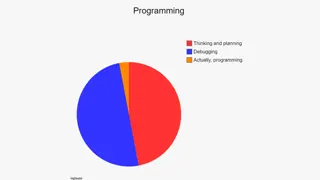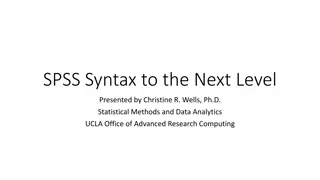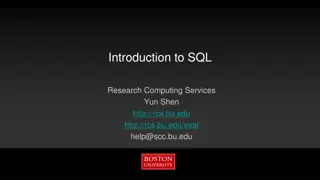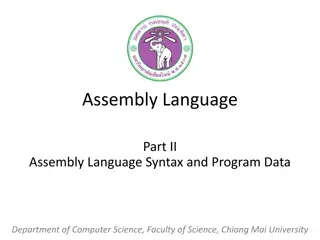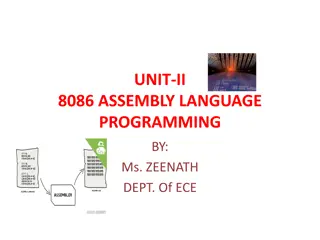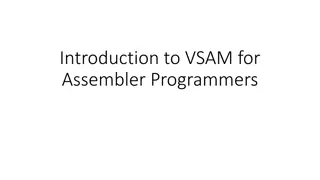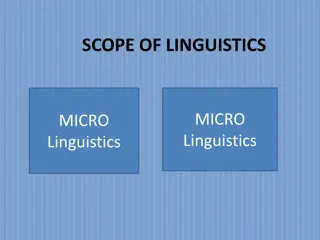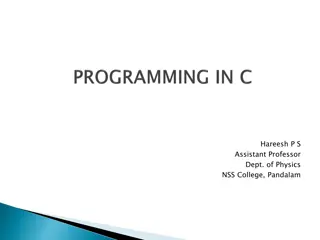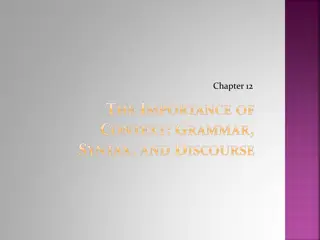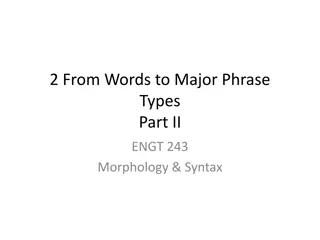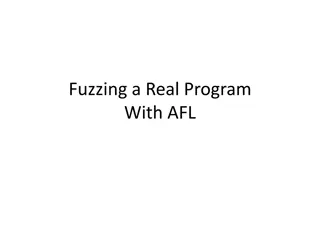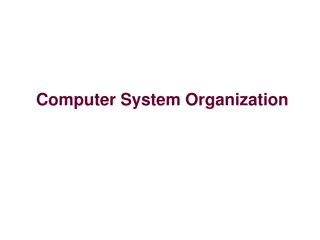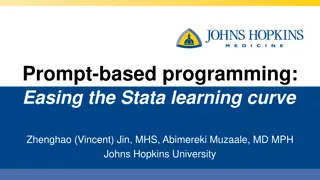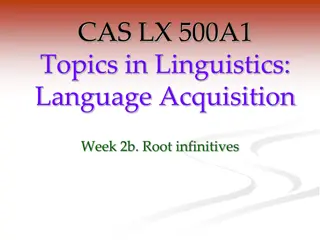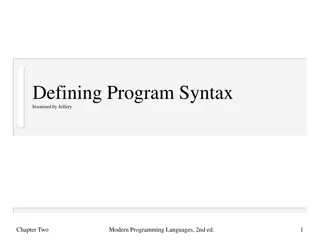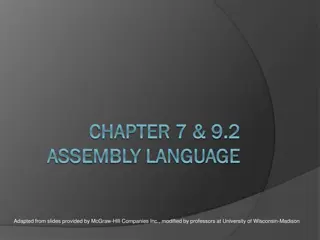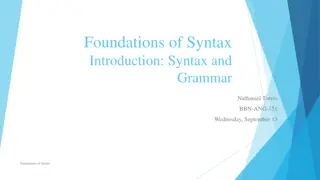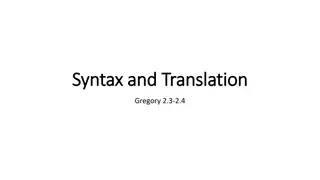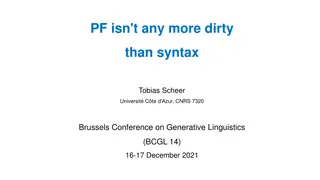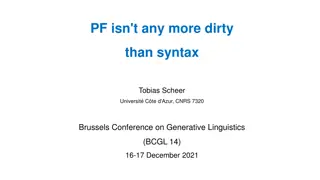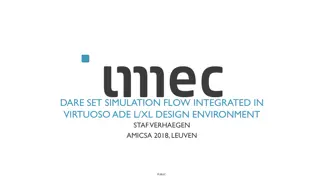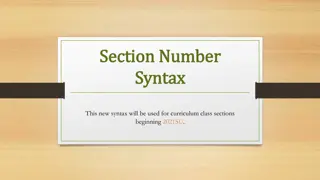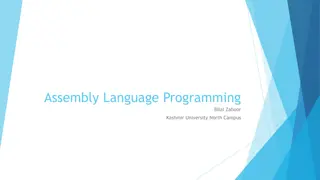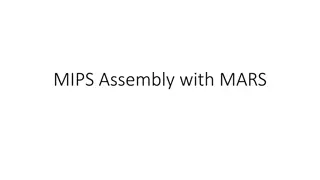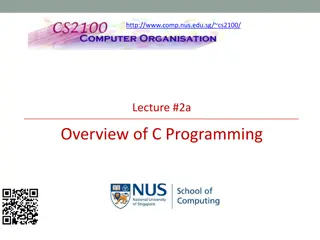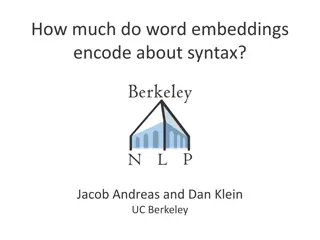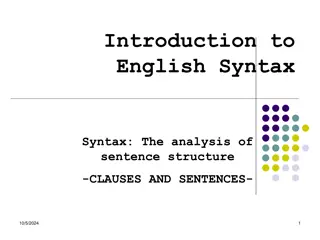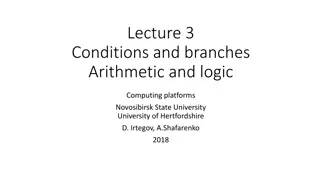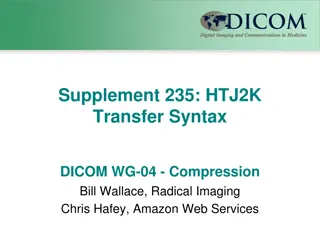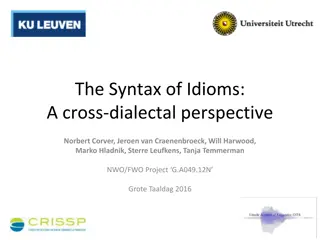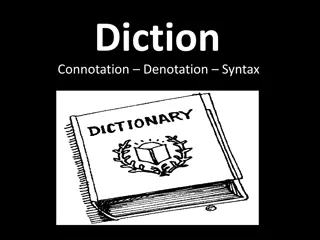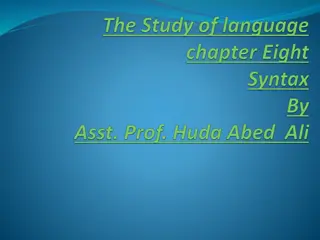Language Syntax Through Syntax Trees
Explore how both programming languages and spoken languages can be parsed into syntax trees, revealing the syntactic structure of sentences. Learn about terminals and non-terminals in syntax trees and how they represent different components of language. Dive into syntax tree abstraction for a deeper
3 views • 32 slides
Mastering SPSS Syntax for Advanced Data Analysis
Delve into the world of SPSS syntax with this workshop by Christine R. Wells, Ph.D., where you will learn to efficiently work with SPSS commands and subcommands, understand when commands execute, and optimize your data analysis process. Discover insider tips on setting options, using SPSS version 28
2 views • 141 slides
Learn SQL Basics: History, Syntax, and Terminology
SQL (Structured Query Language) is a specialized domain-specific language for managing structured data in relational databases. Developed in the 1970s, it follows a rigid syntax and structure, with specific features like triggers and stored procedures. Understanding SQL history, terminology, and syn
1 views • 38 slides
Exceptions in Computer Science
Errors in programming, such as syntax, semantic, runtime, and logical errors, can disrupt the execution of a program. Syntax errors relate to grammatical violations, semantic errors occur when statements lack meaning, and runtime errors happen during program execution due to illegal operations. By i
2 views • 35 slides
Introduction to Assembly Language Syntax and Program Data
Learn about the syntax of assembly language and how data, variables, and constants are used in programming. Explore the basic instructions and the translation of high-level language into assembly language. Discover the role of an assembler in translating assembly language programs into machine langu
5 views • 36 slides
Assembler Directives and Symbols in Assembly Language
Assembly language is a low-level programming language used for computers, microprocessors, microcontrollers, and ICs. It consists of instructions and directives (pseudo instructions). Assembler directives are statements that guide the assembler during the assembly process. Categories of directives i
4 views • 39 slides
Introduction to 8086 Assembly Language Programming
Assembler directives play a crucial role in guiding the assembly process for 8086 assembly language programming. They dictate how operands are handled, memory organization, and more. This content covers essential directives such as ASSUME, DB, DW, DD, DQ, and DT, providing syntax examples and explan
4 views • 29 slides
VSAM: A Comprehensive Overview for Assembler Programmers
VSAM (Virtual Storage Access Method) is a crucial component in mainframe programming, offering various file types like ESDS, RRDS, and KSDS. VSAM data sets are organized into clusters, control areas, and control intervals for efficient data management. Control intervals and areas are dynamically man
6 views • 26 slides
Overview of Micro and Macro Linguistics
Micro linguistics focuses on the scientific study of speech sounds, word formation, syntax, and meaning within a language, while macro linguistics delves into the societal, psychological, and neurological aspects of language use. Micro linguistic areas include phonetics, phonology, morphology, synta
2 views • 7 slides
Programming Languages: Levels and Basics
Programming languages facilitate communication between humans and computers, with machine language being the fundamental binary code understood by computers. Different levels of programming languages exist, from low-level machine language to high-level languages like C. Natural languages are meant f
2 views • 35 slides
Grammar, Syntax, and Discourse in Biblical Texts
Explore the significance of context in analyzing grammar, syntax, and discourse in biblical Greek and Hebrew texts. Learn about the foundational elements, word order, Greek syntax basics, and the importance of discourse analysis. Delve into the definitions of grammar, syntax, and discourse, and unde
2 views • 30 slides
Grammar Structures in Morphology and Syntax
Exploring the relationship between words and major phrase types in English morphology and syntax, this content delves into grammar with lexical categories, constituent structures, and the formation of phrases. It highlights the importance of considering constituents and word grouping for accurate sy
0 views • 35 slides
Practical Guide to Fuzzing Programs with AFL
Explore the process of fuzzing a real program using American Fuzzy Lop (AFL) with NASM, a popular Netwide Assembler. Learn how to obtain AFL and NASM, create test samples, minimize samples, start the fuzzer, and receive tips for successful fuzzing. Embrace the journey that may take days, weeks, or e
2 views • 8 slides
Computer System Organization and Compilation Process
Explore the intricate details of computer system organization, the compilation process, and the role of components like the preprocessor, compiler, assembler, and linker. Learn how programs are processed and executed, from source code to executable code.
1 views • 47 slides
Enhancing Stata Learning with Prompt-Based Programming
Explore the benefits of prompt-based programming in easing the learning curve of Stata software. This innovative approach simplifies syntax, reduces errors, and enhances efficiency for data analysis tasks. By comparing prompt-based versus traditional syntax methods, researchers can improve their ski
1 views • 54 slides
Language Development in Children: Morphology and Syntax Acquisition
Children's language acquisition process involves developing morphology by adding inflectional morphemes to nouns and verbs, such as "-ing" and "-s" for plurals. Overgeneralization occurs as children apply rules, leading to expressions like "foots" and "mens". Additionally, irregular plurals and poss
0 views • 13 slides
Syntax in Language Acquisition: Root Infinitives and Small Clause Hypothesis
Children's syntactic development in language acquisition progresses from one-word utterances to combining words into basic sentences. This stage shows missing elements like tense, subject agreement, and auxiliary verbs. The Small Clause Hypothesis suggests that children initially lack certain struct
0 views • 52 slides
Programming Language Syntax
This content delves into the fundamental aspects of programming language syntax, covering lexical analysis, syntax rules, and semantics. It also explores how grammar works by building parse trees, providing examples from English grammar and programming languages. The use of Backus-Naur Form (BNF) an
0 views • 43 slides
Assembly Language Programming
Assembly language provides a bridge between human-readable instructions and machine code, making it easier for programmers to interact with hardware. This content covers the basics of assembly language syntax, opcodes, operands, and labels, as well as the role of the assembler in converting human-re
0 views • 74 slides
Essential Rules and Syntax for Naming and Using Variables in Bash Scripting
Learn the fundamental rules for naming variables in Bash scripting, understand the syntax for defining user-defined variables, and discover key considerations for assigning values and working with case-sensitive variables. Make the most of your scripting by following these guidelines closely.
0 views • 27 slides
The Foundations of Syntax in Language
Delve into the basics of syntax and grammar, exploring the essence of language, syntax rules, morphemes, and morphemic decomposition. Discover how syntax shapes meaningful communication and learn to identify morphemes in English words.
1 views • 17 slides
Syntax and Translation in Logic
Explore the world of syntax and translation in logic through topics such as forming well-formed formulas, identifying main connectives, De Morgan's Laws, Venn diagrams, necessary and sufficient conditions, and more. Discover the language of logic, vocabulary, truth-functional connectives, punctuatio
0 views • 46 slides
Minimalism in Linguistics: Dirty PF and Clean Syntax
This text delves into the relationship between syntax and PF (Phonological Form) in the context of minimalism theory in linguistics. It discusses how minimalism aims to achieve clean syntax by discarding imperfect elements, with PF often considered as "dirty" due to its association with phonology. T
0 views • 40 slides
Minimalist Approach to Syntax and Phonology in Linguistics
The discussion delves into the relationship between syntax and phonology in linguistics, emphasizing the minimalist approach that aims to create a clean syntax while considering phonology as an ancillary element. It explores the idea that syntax is central to grammar, while phonology is considered '
0 views • 40 slides
Advanced Simulation Integration in Virtuoso Design Environment
Explore the seamless integration of simulation flows in the Virtuoso ADE L/XL design environment, showcased at AMICSA 2018 in Leuven. From DARE set simulations to Wish List features and historical advancements like SET Striker Verilog-A models, the presentation highlights the compatibility with ADE
0 views • 26 slides
Mastering Voice in Writing: Diction, Detail, Imagery, Syntax, and Tone
Enhance your writing by mastering the elements of voice - diction, detail, imagery, syntax, and tone. Discover how word choice shapes effective communication and learn the importance of clarity and precision in creating impactful writing.
0 views • 28 slides
Easy Ada Tooling with Libadalang
Explore the functionalities and benefits of using Libadalang for Ada programming, including querying and altering data, incremental error recovery, syntax analysis, semantic tolerance, and more. Discover how this tool enables easy binding generation to multiple languages and ecosystems, facilitating
0 views • 16 slides
New Syntax for Curriculum Class Sections Starting 2021
Introducing a new syntax for class sections beginning in 2021SU, providing advantages and a table of options for location, delivery method, length of class, section count, and other specific information. The simple format aims to offer visibility and flexibility, enabling staff to build sections eff
0 views • 14 slides
Overview of Assembly Language Programming in 8086 Architecture
Assembly language programming in the 8086 architecture involves writing case-sensitive instructions represented by statements. Each statement corresponds to an 8086 instruction or an assembler directive. Instructions follow a specific format with optional components like labels and comments. Assembl
0 views • 31 slides
Introduction to MIPS Assembly Programming with MARS
Introduction to MIPS Assembly Programming with MARS including instructions, I-Type format, register initialization, addi instructions, and translation to machine code using an assembler. Learn how to perform basic arithmetic operations in MIPS assembly language.
0 views • 61 slides
Overview of C Programming Basics and Syntax
This content provides a comprehensive overview of C programming, covering topics such as basic syntax, variables, data types, program structure, selection statements, repetition statements, and an introduction to the C programming language. It also includes a quick review on editing, compiling, and
0 views • 24 slides
Exploring Word Embeddings and Syntax Encoding
Word embeddings play a crucial role in natural language processing, offering insights into syntax encoding. Jacob Andreas and Dan Klein from UC Berkeley delve into the impact of embeddings on various linguistic aspects like vocabulary expansion and statistic pooling. Through different hypotheses, th
0 views • 26 slides
English Syntax: Clauses and Sentences Analysis
Delve into the major properties of clauses, including finite verbs, mood distinctions, and descriptions of situations and participants. Explore compound and complex sentences with main and subordinate clauses, along with complement clauses in English syntax analysis.
0 views • 27 slides
Arithmetic and Logic Computing in CdM-8
Explore the fundamental concepts of arithmetic and logic computing, including conditions, branches, arithmetic instructions, logic instructions, shift and move instructions, and the practical applications of shift operations. Delve into CdM-8 flags semantics, C and unsigned subtraction/comparison, b
0 views • 14 slides
Revolutionizing Image Compression with HTJ2K Transfer Syntax
Revolutionize image compression with HTJ2K Transfer Syntax, a groundbreaking technology that addresses existing challenges in compression standards like JPEG 2000. HTJ2K offers improved decode and encode speeds, strong open-source support, and scalable resolution access. Explore how HTJ2K is reshapi
0 views • 6 slides
Exploring the Syntax of Idioms: A Cross-Dialectal Study
Delve into the intricacies of idiomatic expressions through a cross-dialectal perspective, examining both internal and external syntax, and criteria for identifying verbal idioms. Researchers investigate the regular syntactic rules governing idiomatic structures and their interaction with non-idioma
0 views • 46 slides
Diction, Connotation, Denotation, and Syntax in Writing
Explore the nuances of diction, connotation, denotation, and syntax in writing through examples and explanations. Discover how word choice, emotional undertones, literal meanings, and sentence structure impact the effectiveness and perception of written work. Enhance your understanding of these key
1 views • 10 slides
Grammar and Syntax in Linguistics
Grammar and syntax are two fundamental components of language study. Grammar entails rules for correct language usage, while syntax focuses on sentence structures. Deep and surface structures, along with examples and distinctions between active and passive voice sentences, are explored. Structural a
0 views • 21 slides
Linguistic Evolution of Hungarian: From Ugric to Modern Syntax
The origin of the Hungarian language is debated, with doubts arising due to limited evidence of Uralic roots. Variations in syntax between Ugric and Hungarian are analyzed, suggesting a shift over time. Early Old Hungarian texts display remnants of Ugric structures, providing insights into the langu
2 views • 44 slides
Comprehensive Guide to Ontology Editors and IDEs for Ontologies
Explore a wide range of Ontology Editors and Integrated Development Environments (IDEs) for managing ontologies efficiently. From simple text editors to advanced IDEs like Protégé and Web Protege, learn about various tools and syntax options available. Dive into Ontology Editors like Protégé 4.3
0 views • 16 slides
